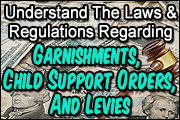Training For Massachusetts Garnishment Law Requirements
Training For Massachusetts Garnishment Law Requirements
 What Is A Garnishment?
What Is A Garnishment?A wage garnishment is any legal or equitable procedure through which some portion of a person's earnings is required to be withheld by an employer for the payment of a debt.
The six basic types of garnishments are child support, federal, state, or local levies, creditor garnishments, and student loans, with the largest amount of garnishments being for child support.
Employer Guidelines For Handling GarnishmentsEmployers generally have to notify the debtor in writing that a wage garnishment is about to start before making a garnishment and sending payments to the creditor. The wage garnishment then typically continues until the debts are paid off or otherwise resolved. Employers are required to provide employees with a copy of garnishment paperwork.
With regard to child support garnishments, all states are required to use the "Order/Notice To Withhold Income For Child Support" notice for Child Support. This notice is designed to provide employers with key information so that they do not have to decipher unfamiliar orders/notices from different states. Click
here for details on this notice, including steps to process this notice.
Employers should note that they cannot contest the income-withholding order; however, the employer should contact the issuing agency if unable to implement the withholding either because the individual named in the order is not an employee or a withholding is already in place for the child and employee. Additionally, employers should note that states often have varying garnishment rules, so they should be sure to know the payroll wage garnishments rules for the state(s) in which it does business.
Massachusetts Wage Garnishment Rules
Employers should be aware that there are two general types of garnishments, one for child support and one for creditors (commonly referred to as "levies").
Massachusetts allows many reasons for wage garnishment orders. While most states limit the reasons for garnishments to child support, alimony, and two or three other reasons, Massachusetts permits wage garnishment orders for things such as student loans, personal loans, back taxes, and delinquent credit cards, aka "levies".
Re child support orders, the maximum amount that can be withheld runs between 50 (if the employee is supporting another spouse and/or children) and 65% (if the employee is not supporting another spouse and/or children and is at least 12 weeks in arrears in making support payments).
Re levies, creditors such as landlords, hospitals, and credit card companies must first obtain a court order entitling them to a wage garnishment.
Regarding the amounts that can be garnished, creditors can obtain either up to 15% of the debtors’ wages through wage garnishment or 50 times the greater amount of either the federal minimum wage or Massachusetts state minimum wage for each week the employee works.
Recommended Garnishment Training Courses:
Find Seminars, Webinars, And Online Training In Your Area
Contact Info For Massachusetts Garnishments Law
100 Cambridge Street,
2nd Floor
Boston, MA 02114
(617) 887-6367
References and DisclaimersThis information is based on a variety of state laws and regulations, and is subject to change. The PayrollTrainingCenter makes every effort to make sure this information is current and accurate, however, the PayrollTrainingCenter is not engaged in rendering legal or professional advice and shall not be held responsible for any inaccuracies contained herein.
https://www.garnishmentlaws.org/massachusetts-garnishment-laws/
https://www.nolo.com/legal-encyclopedia/massachusetts-wage-garnishment-laws.html


 What Is A Garnishment?
What Is A Garnishment?